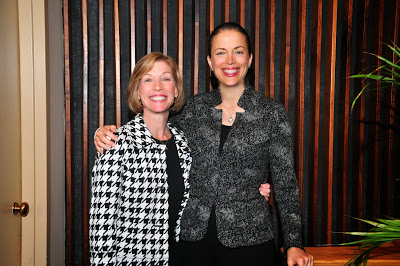This week marks the annual Crohn’s and Colitis Awareness Week, an effort led by the Crohn’s and Colitis Foundation of America to educate the public about inflammatory bowel disease (IBD) and to generate new support for finding cures.
IBD refers to a group of inflammatory conditions of the digestive tract, including Crohn’s disease and ulcerative colitis. Individuals with IBD, along with their families and caregivers, can face stressful challenges and stigma about the condition. Yet many people find comfort when they are able to connect with others who have shared similar experiences.
That’s why Randi Sigal and Pam Levy started IBD Connect, a network of volunteers that offers support and encouragement to those who have personally experienced IBD. Here, we ask Sigal and Levy about the initiative.
Q: What exactly is IBD Connect?
A: IBD Connect is a volunteer support network for patients, families and caregivers who are affected by IBD. The reason we started this service is because we both have personal and family experiences with these diseases. While we received excellent care, we felt there was a void in support for patients who were going through the same struggles and traumas that we had experienced. We wanted to fill this void by offering person-to-person interactions that diminish fear, provide helpful information, and restore hope while demonstrating the ability to live a fulfilling life.
We saw our first patient in September 2012, and have seen more than 250 patients since then. So,we’re encouraged that we’re helping meet the growing need for support.
Q: Was the stigma about IBD a factor in creating this network?
A: Yes, definitely. Certain diseases are openly talked about, but with IBD there is unfortunately often a stigma attached. People often aren’t comfortable talking about their disease. This can lead to isolation, which can be debilitating and depressing. IBD Connect encourages people to be more comfortable and open.
While there are support groups available, we felt that talking to patients one-on-one has a unique and special power. We wanted to spread the message that IBD does not have to define who you are – what you do with it remains in your control.
Q: How does the support system work?
A: We chose to focus on the inpatient population since they are more vulnerable. These patients can include those recently undergoing surgery, experiencing a flare of their disease or newly diagnosed.
This means visiting patients and families while they’re at the hospital, and letting them verbalize how they feel, what they’re going through, and venting their frustrations. We also provide resources and education so they don’t have to figure out next steps by trial and error. We also continue to be available to patients even after they’ve left the hospital.
Q: Who are the volunteers in the network?
A: All of the volunteers in our network have IBD themselves or someone in their families has IBD. This enables the patient to feel more comfortable talking about their experience. We’re currently working on expanding a database of volunteers so we can match patients and volunteers that have similar experiences, such as being the same gender and age.
Q: What were your personal experiences with IBD?
A: Sigal: My sister-in-law was diagnosed with Crohn’s disease 30 years ago, and my twin sons were diagnosed one month apart in January and February of 2009. Then, in October of 2009, my son’s small bowel perforated and he had to have emergency surgery. This life-threatening experience was very traumatic. Our hospital experience led to the creation of our network. We wanted to help others facing the experience as well as the transition home – the idea of going home on our own was very frightening, and we weren’t sure what resources were available. I then approached my dear friend Pam, and the partnership came together.
Levy: It is also a family disease for me as my father had and my sister currently has ulcerative colitis. It was something I grew up with and adapted to from an early age. When we first approached Dr. Miguel Regueiro and the IBD team with the idea, we said we would feel successful even if we helped just one person.
IBD Connect volunteers primarily see patients at UPMC Presbyterian and UPMC Montefiore. To learn more, call 412-864-1784 or email IBD.connect@gmail.com. Volunteers are available to make hospital visits or speak with patients, families or caregivers over the phone.









